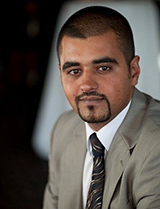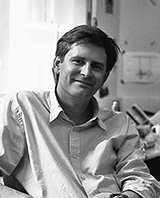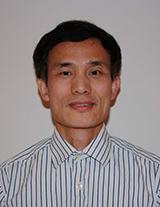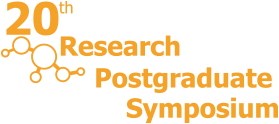Plenary Lecture
- From Molecular Profiling to Precision Oncology: 100 Years since Paul Ehrlich
- All-optical Interrogation of Neural Circuits
- Precision Medicine in Cancer Treatment: Molecular Basis and Therapeutic Strategies
 From Molecular Profiling to Precision Oncology: 100 Years since Paul Ehrlich
From Molecular Profiling to Precision Oncology: 100 Years since Paul Ehrlich
Dr Fares Al-Ejeh | B. Biotechnology (hons) PhD
Team Head – Personalised Medicine Team
ARC Future Fellow
Senior Research Fellow
Cell and Molecular Biology, Cancer Division
QIMR Berghofer Medical Research Institute, Brisbane, Australia
Dr Al-Ejeh is an ARC Future Fellow and a Senior Research Fellow at the Cancer Division of the QIMR Berghofer MRI. He was awarded his Bachelor of Biotechnology then his PhD in 2005 from the University of Wollongong (NSW, Australia) and undertook his first post-doctoral position at the Royal Adelaide Hospital/Hanson Institute (SA, Australia) to undertake a commercially-funded project. Dr Al-Ejeh joined QIMR Berghofer (QLD, Australia) in 2010 as senior research officer and recently established his own group, Personalised Medicine. Dr. Al-Ejeh has strong track record in cancer cell biology and the development of targeted therapies. His track record includes three patents in addition to peer-reviewed publications. He has been developing diagnostic approaches and targeted therapies against aggressive cancers including triple negative breast cancer, pancreatic adenocarcinoma, and glioblastoma and others.
Most cancers are managed in a personalised manner where the most effective treatments are offered based on several clinico-pathological indicators. Despite considerable advancement in oncology since Paul Ehrlich’s side chains theory, which we now know as macromolecules and “magic bullets”, heterogeneity in clinical outcomes is still a challenge and an indicate that some cancer patients are not receiving the right treatments. Our era of high throughput molecular profiling now promises more precision in personalised oncology. This seminar will present this group’s most recent work in the area of precision oncology, including recently patented work in 2015 relating to prognostic/companion diagnostic tests and novel possible drug targets for aggressive breast cancers.
 All-optical Interrogation of Neural Circuits
All-optical Interrogation of Neural Circuits
Professor Michael Häusser
Wolfon Institute for Biomedical Research
University College London
Michael Häusser is Professor of Neuroscience at University College London and a Principal Research Fellow of the Wellcome Trust. He received his PhD from Oxford University under the supervision of Julian Jack. He subsequently worked with Nobel Laureate Bert Sakmann at the Max-Planck-Institute for Medical Research in Heidelberg and with Philippe Ascher at the Ecole Normale Superieure in Paris. He established his own laboratory at UCL in 1997 and became Professor of Neuroscience in 2001. His group is interested in understanding the cellular basis of neural computation in the mammalian brain using a combination of experiments and theory, with a special focus on the role of dendrites. His group has helped to pioneer several new optical approaches for probing the function of neural circuits in the intact brain.
Neural circuits display complex spatiotemporal patterns of activity on the millisecond timescale during behavior. Understanding how these activity patterns drive behavior is a fundamental problem in neuroscience, and remains a major challenge due to the complexity of their spatiotemporal dynamics. The ability to simultaneously image and manipulate patterns of activity in neural circuits at cellular resolution would open up new frontiers in neuroscience. I will describe a strategy for "all-optical" interrogation of neural circuits in vivo with single-spike and single-neuron precision. Two-photon calcium imaging is combined with two-photon optogenetic activation using coexpression of a red-shifted opsin and a genetically encoded calcium indicator. A spatial light modulator allows tens of user-selected neurons to be targeted for spatiotemporally precise optogenetic activation, while simultaneous fast calcium imaging provides high-resolution network-wide readout of the manipulation with negligible optical cross-talk. Proof-of-principle experiments in mouse barrel cortex and visual cortex demonstrate interrogation of the same neuronal population during different behavioral states and targeting of neuronal ensembles based on their functional signature. This approach extends the optogenetic toolkit beyond the specificity obtained with genetic or viral approaches, enabling high-throughput, flexible and long-term optical interrogation of functionally defined neural circuits in vivo.
Packer AM, Russell LE, Dalgleish HW, Häusser M (2015). Simultaneous all-optical manipulation and recording of neural circuit activity with cellular resolution in vivo.
Nature Methods 12(2):140-6.
 Precision Medicine in Cancer Treatment: Molecular Basis and Therapeutic Strategies
Precision Medicine in Cancer Treatment: Molecular Basis and Therapeutic Strategies
Professor Peng Huang MD, PhD
Department of Translational Molecular Pathology
The University of Texas MD Anderson Cancer Center
Peng Huang, MD, PhD, is an Ashbel Smith Endowed Professor at the University of Texas MD Anderson Cancer Center, with a joint appointment at Sun Yat-sen University Cancer Center. He received his medical education in Sun Yat-sen University Medical School and his PhD degree in cancer pharmacology from the University of Texas Health Science Center in Houston, USA. Dr Huang was appointed as Assistant Professor at the University of Texas MD Anderson Cancer Center in 1995, and promoted to Associate Professor with tenure in 2001 and Full Professor in 2007. His research interests are in the areas of cancer metabolism, ROS/redox biology, and anticancer agents. In particular, his laboratory investigates the mechanistic links between oncogentic signals, mitochondrial alterations, and changes in cellular metabolism and drug sensitivity. Based on the differences between cancer cells and normal cells in their energy metabolism and ROS/redox regulation, Dr Huang’s laboratory develops novel therapeutic strategies and new agents to selectively kill cancer cells, aiming at improving therapeutic activity and selectivity for cancer treatment. He has published over 130 papers including those in high-impact journals such as Nature, Cancer Cell, Nature Cell Biol, JNCI, and Nature Rev. Drug Discovery. His research has been continuously funded by NIH for over 20 years. Professor Huang is currently Associate Editor of Molecular Cancer and a member of editorial boards of multiple scientific journals.
Precision medicine is an emerging approach for disease prevention and treatment that takes into account of patient’s individual variations in genes and environment. In cancer treatment, it refers to the tailoring of therapeutic strategies according to the individual characteristics of each cancer patient. Although conventional chemotherapy and radiotherapy currently still remain as the mainstay of cancer treatment, this situation is changing rapidly in the recent years as the results of the cancer-genome project and the major progress in the development of gene-targeting anticancer agents. Treatment of cancer patients using specific targeted drugs according to their individual genetic alterations has clear advantage over traditional chemotherapy, manifested by high specificity and low toxic side-effect. However, major challenges still remain due to complex involvement of multiple genes in cancer development, heterogeneity in cancer cells, and genetic instability. The presence of cancer stem cells that are drug resistant imposes further challenges. This presentation will discuss the molecular and biochemical basis for precision medicine in cancer treatment and potential challenges, and will also offer some new perspectives and strategies to overcome such challenges. A special emphasis will focus on cancer metabolism and applications of the new knowledge gained in this field to cancer treatment.

